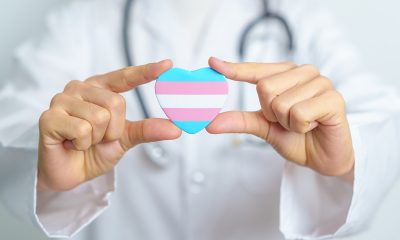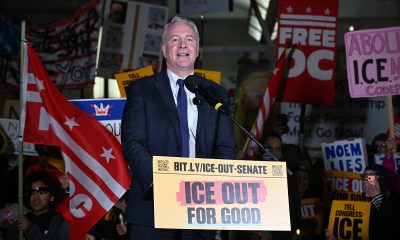Local
3 hospitalized after spate of anti-LGBT violence
One gay man shot, another beaten; trans woman knocked unconscious
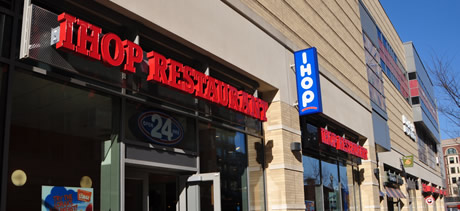
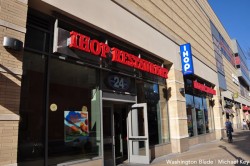
The International House of Pancakes restaurant in Columbia Heights (Washington Blade photo by Michael Key)
One gay man was shot in a Columbia Heights restaurant on March 11 and another gay man and a transgender woman were badly beaten on the street the following day in separate incidents during a period of just over 24 hours.
The gay male victims remained hospitalized this week, with one being treated for a bullet wound to his liver and the other awaiting surgery Wednesday afternoon to repair a broken jaw. The transgender woman was treated and released for a head injury after being knocked unconscious.
Police have listed the attacks against the two gay men as anti-gay hate crimes. The attack against the transgender woman was not listed as a hate crime but police are looking into the possibility that it may have been an anti-trans hate crime, according to a police report. Officers assigned to the police Gay & Lesbian Liaison Unit were said to be involved in the investigation into each of the incidents.
“We appreciate [D.C.] Metropolitan Police Department’s prompt action regarding the recent attacks and we offer the victims our strongest support while recovering,” said A.J. Singletary, chair of the local group Gays & Lesbians Opposing Violence (GLOV). “We expect MPD to respond by increasing patrols in the affected areas and tenaciously investigating the crimes committed.”
A police report for the shooting incident says the incident began when a male suspect got into a verbal altercation with the victim, a 31-year-old gay man, about 6:30 a.m. Sunday, March 11. The report says the incident took place inside the International House of Pancakes restaurant on the 3100 block of 14th Street, N.W. in Columbia Heights.
The report says a fist fight ensued between the suspect and the victim and that two other suspects, a male and a female, got involved. It says a witness reported hearing a gunshot during the physical altercation and saw the three suspects leave the restaurant and flee in an eastbound direction along Irving Street, N.W.
“Complainant 1 complained of pain to his chest area,” the report says. “Further investigation revealed that C-1 had been shot with an unknown caliber of firearm and was transported to [a hospital] by ambulance.”
Aaron Woodland, who identified himself as the victim’s cousin, said he and another cousin were with the victim at the restaurant when the incident occurred. According to Woodland, the three suspects were sitting at a table near where the victim and the two cousins were seated. He said the suspects referred to the victim and the two cousins repeatedly as “faggies” while the two parties sat at their separate tables.
Woodland said the altercation began when the victim got up to pay the restaurant bill and the three suspects blocked his path. He said a fight started after the victim pushed his way past the suspects.
“Once he did that they started calling him faggy again,” said Woodland.
Woodland said the victim was being treated for a gunshot wound to the liver and was expected to be released from the hospital in about a week.
Police have listed the incident as a hate-related assault with intent to kill.
A police source said the second incident occurred about 9:30 p.m. Monday, March 12, at the intersection of Georgia Avenue and Irving Street, N.W., when the victim, a 29-year-old gay man, got out of a cab about two blocks from his home. The source said accounts from witnesses indicate two or three male suspects attacked the victim while calling him anti-gay names as he began to walk home.
Rodney Shaffer, the victim’s partner, said the victim, who asked that his name not be disclosed, told him he remembers being dragged along the street by the attackers, who did not attempt to rob him. Shaffer said the victim called him for help on his cell phone after the attackers walked away. Seconds later, Shaffer said, another group of attackers took the victim’s cell phone, iPad and wallet, leaving the victim lying on the street in a semi-conscious state.
Shaffer said the victim was scheduled to undergo surgery Wednesday afternoon to repair a broken jaw. He said the attackers’ blows to his head and face that caused the jaw to break were so severe that the victim had to be sedated with a breathing tube inserted to prevent swelling of tissue caused by the injury from preventing him from breathing.
According to Shaffer, a detective said police were in the process of obtaining a video recording that they hoped has captured the attack through cameras installed in various locations near the site of the incident. Police planned to release posters seeking witnesses of the incident, Shaffer said.
Police reports show that the third incident occurred March 12 at about 11:50 p.m. when a transgender woman was attacked by two young male suspects on the street at West Virginia Avenue and Mt. Olivet Street, N.E.
A police report says the victim reported being hit from behind and knocked unconscious. The report says the victim initially told police she could not remember what, if anything, was said at the time of the assault.
Based on a lack of evidence to indicate the attackers used anti-transgender language or showed an anti-trans bias, the case could not immediately be listed as a hate crime, the police report said.
However, when the victim was being interviewed later at the hospital, she was asked if she thought she was targeted because of her status as a transgender woman, says the report, which was prepared by Officer S.D. Hall, an affiliate member of the police Special Liaison Unit.
Hall said in her report that the woman replied that she did believe she was attacked because of her status as a transgender woman.
The police report for the shooting incident at the IHOP restaurant provides these descriptions of the suspects: Suspect 1—black male between 20 and 23 years old, about 5 feet 5 inches to 5 feet 6 inches tall, brown eyes and black hair in a crew cut; light brown complexion and a slender build; Suspect 2: black male between 20 and 25 years old, 6 feet to 6 feet 2 inches tall, weighing between 190 and 220 pounds, brown eyes, black dreadlocks, medium brown complexion and medium or average build; Suspect 3: black female between 20 and 23 years old, 5 feet 3 inches to 5 feet 6 inches tall, weighing between 190 and 200 pounds, brown eyes, hair in braids, medium complexion and a “heavy/fat/stocky” build.
A description of the suspects in the other two incidents wasn’t immediately available.
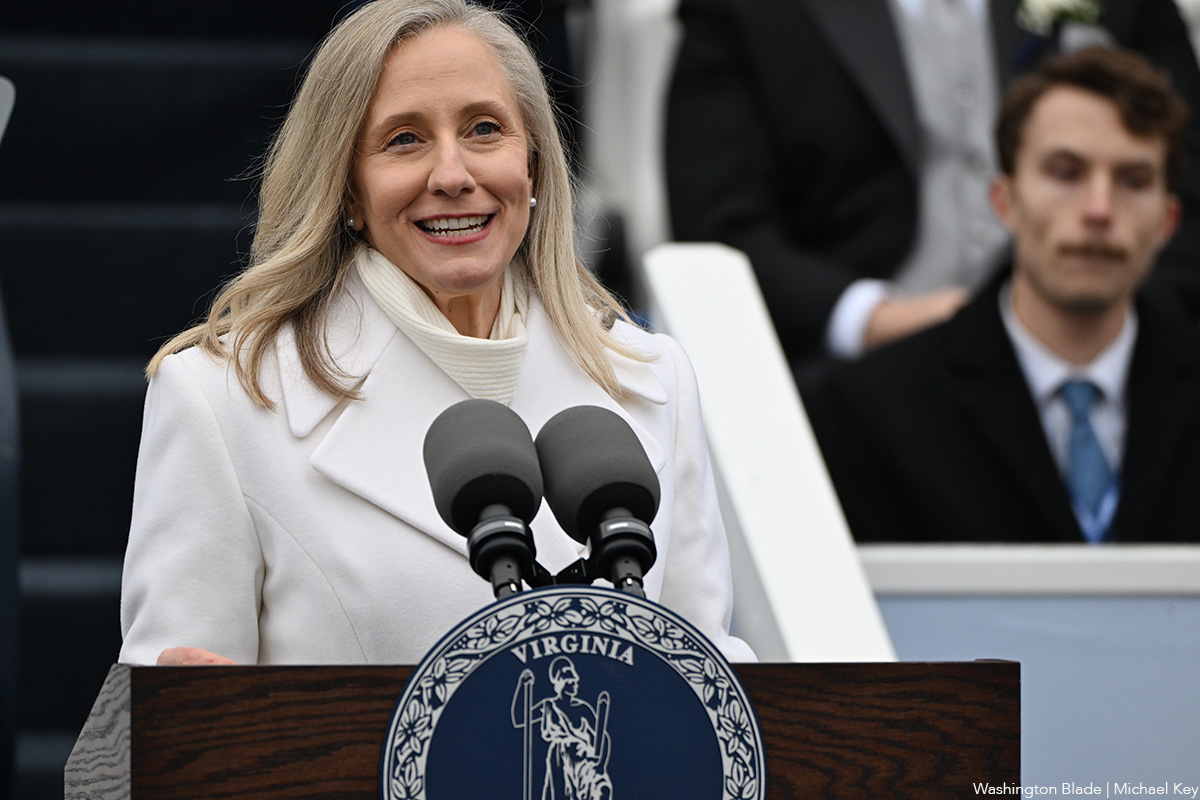
Abigail Spanberger was sworn in as the 75th governor of Virginia at a ceremony on the grounds of the Virginia State Capitol on Saturday. Thousands of spectators watched the swearing-in ceremony and parade, despite the rain and temperatures in the low 40s.
Spanberger, a member of the Democratic Party and an LGBTQ ally, became the first woman to be Virginia’s governor.
View on Threads
Newly-elected Attorney General Jay Jones, Lt. Gov. Ghazala Hashmi, and Spanberger were each administered the oath of office in the public ceremony.
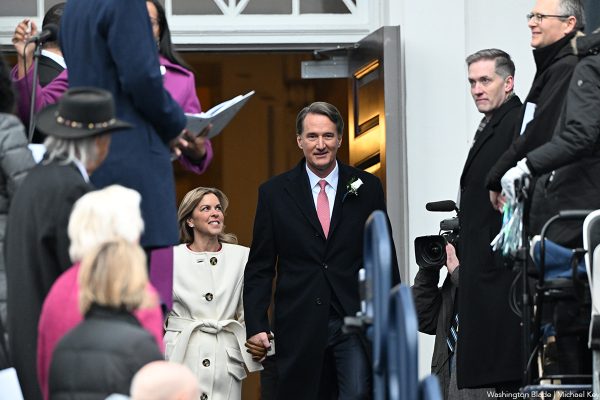
Republican former Gov. Glenn Youngkin left the ceremony shortly after the oath of office was administered to Spanberger and before the inaugural address.
In her speech, the new governor made an appeal to bipartisanship and looking past division in our current moment.
“To my friends in the General Assembly — on both sides of the aisle — I look forward to working with you,” said Spanberger. “I know what it means to represent your constituents, to work hard for your district, and to pursue policies you believe in. We will not agree on everything, but I speak from personal experience when I say that we do not have to see eye-to-eye on every issue in order to stand shoulder-to-shoulder on others.”
Spanberger acknowledged Virginians’ frustrations with federal layoffs and governmental policy.
“I know many of you are worried about the recklessness coming out of Washington. You are worried about policies that are hurting our communities — cutting healthcare access, imperiling rural hospitals, and driving up costs,” said Spanberger. “You are worried about Washington policies that are closing off markets, hurting innovation and private industry, and attacking those who have devoted their lives to public service.”
Spanberger alluded to the Trump-Vance administration, though never mentioned President Donald Trump’s name in her remarks.
Spanberger said, “you are worried about an administration that is gilding buildings while schools crumble, breaking the social safety net, and sowing fear across our communities, betraying the values of who we are as Americans, the very values we celebrate here on these steps.”
The new governor then spoke of her priorities in office, pledging to tackle housing affordability by working to “cut red tape” and increase housing supply. Spanberger also spoke of forestalling an impending healthcare crisis by protecting access and cracking down on “middlemen who are driving up drug prices.”
Spanberger spoke of investments in education at every level, standing up for workers (including the large number of federal workers in Virginia), and taking action on gun violence.
Virginia married couple Mary Townley and Carol Schall witnessed the inauguration ceremony from the stands set up on the grounds of the Capitol. Schall and Townley are one of the plaintiff couples in the case that challenged the Virginia constitutional ban on same-sex marriage.
Same-sex marriage became legal in Virginia in 2014.
“We are delighted with the inauguration of Abigail Spanberger as governor of Virginia,” Schall told the Washington Blade. “The celebration of her inauguration was full of the beautiful diversity that is Virginia. The Virginia Pride contingent was included as a part of what makes Virginia a great place to live.”
“Such an honor to attend such a wonderful event in Virginia history,” Townley told the Blade. “The weather before the Inauguration was cold and rainy, but I believe it represented the end of a dreary time and it ushered in the dry and sunny weather by the end of the inaugural parade. Madam Governor brought us to the light!”
The inaugural parade following the governor’s remarks included a contingent from Diversity Richmond and Virginia Pride. Marchers in the LGBTQ contingent carried a giant Progress Pride flag and were met with loud cheers from the gathered spectators.
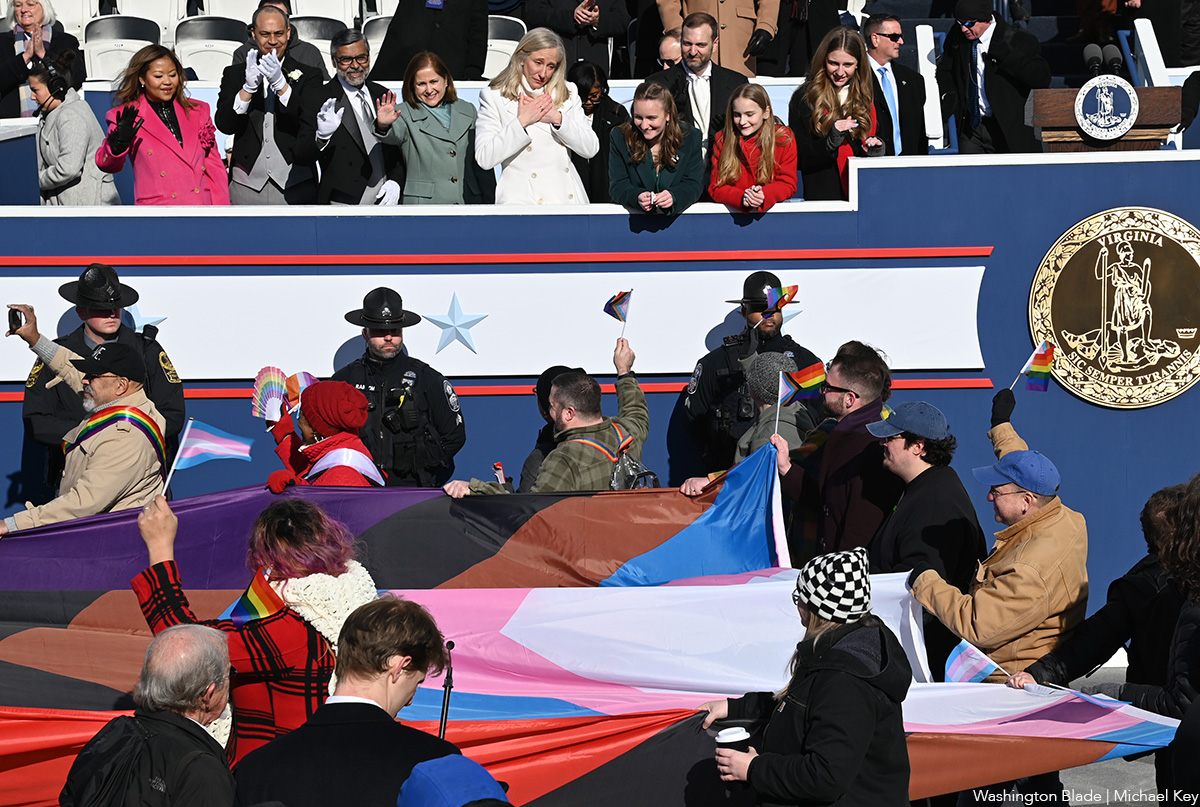
Spanberger after her inauguration signed 10 executive orders. One of them bans discrimination against state employees based on sexual orientation, gender identity, and other factors.
“By virtue of the authority vested in me as Governor under Article V of the Constitution of
Virginia, I hereby declare that it is the firm and unwavering policy of the Commonwealth of Virginia to ensure equal opportunity in all facets of state government,” reads the executive order. “The foundational tenet of this executive order is premised upon a steadfast commitment to foster a culture of inclusion, diversity, and mutual respect for all Virginians.”
Virginia
VIDEO: LGBTQ groups march in Va. inaugural parade
Abigail Spanberger took office on Saturday
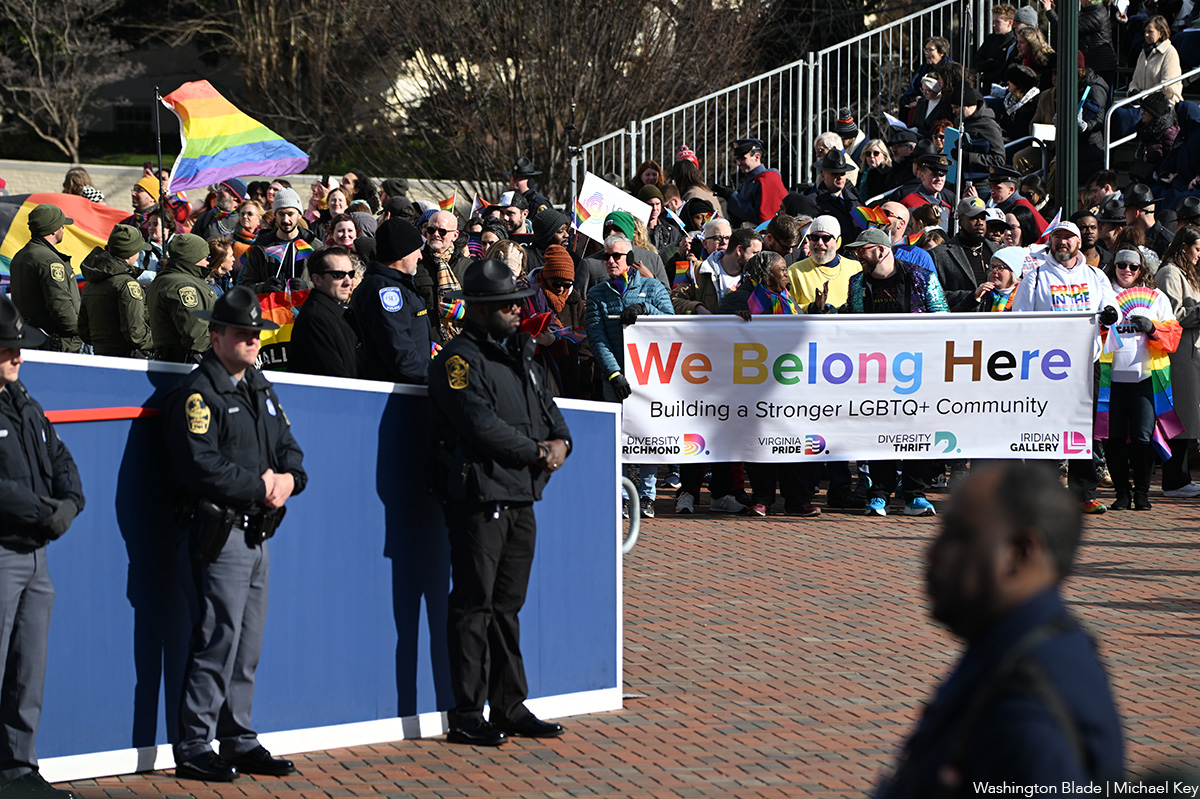
The inaugural ceremonies for Virginia Gov. Abigail Spanberger were held in Richmond, Va. on Saturday. Among the groups marching in the parade were Diversity Richmond and the Virginia Pride project of Diversity Richmond.
View on Threads
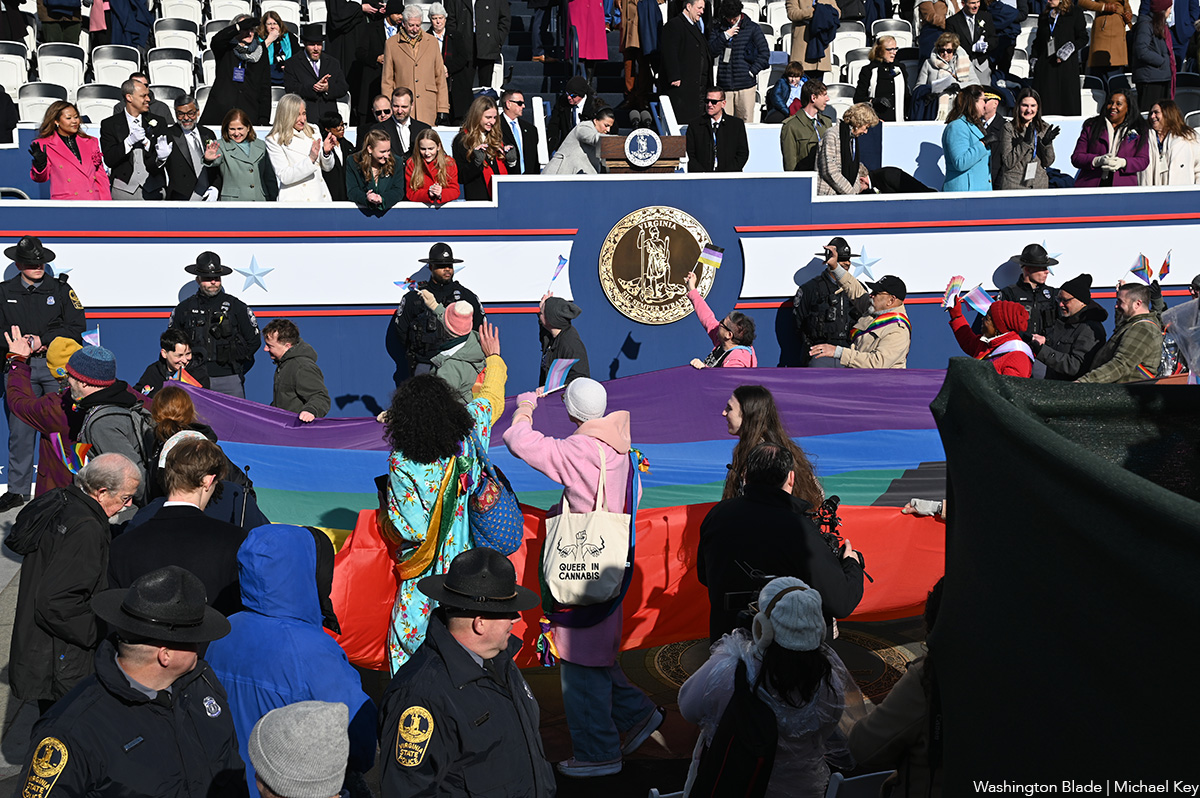
Virginia
Va. Senate approves referendum to repeal marriage amendment
Outgoing state Sen. Adam Ebbin introduced SJ3

The Virginia Senate on Friday by a 26-13 vote margin approved a resolution that seeks to repeal a state constitutional amendment that defines marriage as between a man and a woman.
Outgoing state Sen. Adam Ebbin (D-Alexandria) introduced SJ3. The Senate Privileges and Elections Committee on Wednesday approved it by a 10-4 vote margin.
Same-sex couples have been able to legally marry in Virginia since 2014. Outgoing Republican Gov. Glenn Youngkin in 2024 signed a bill that codified marriage equality in state law.
A resolution that seeks to repeal the Marshall-Newman Amendment passed in the General Assembly in 2021. The resolution passed again in 2025.
Two successive legislatures must approve the resolution before it can go to the ballot. Democrats in the Virginia House of Delegates have said the resolution’s passage is among their 2026 legislative priorities.
“It’s time for Virginia’s Constitution to reflect the law of the land and the values of today,” said Ebbin after Friday’s vote. “This amendment, if approved by voters, would affirm the dignity of all committed couples and protects marriage equality for future generations.”
-

 Iran4 days ago
Iran4 days agoGrenell: ‘Real hope’ for gay rights in Iran as result of nationwide protests
-

 Congress5 days ago
Congress5 days agoVan Hollen speaks at ‘ICE Out for Good’ protest in D.C.
-

 LGBTQ Non-Profit Organizations5 days ago
LGBTQ Non-Profit Organizations5 days agoNational LGBTQ Task Force brings Creating Change conference back to D.C.
-

 Virginia4 days ago
Virginia4 days agoMark Levine loses race to succeed Adam Ebbin in ‘firehouse’ Democratic primary




